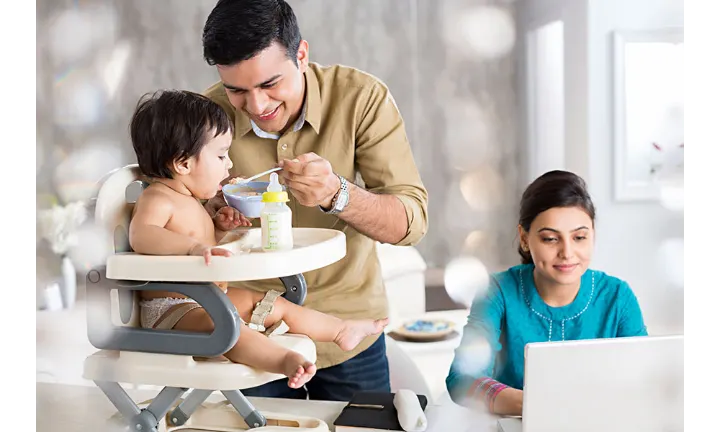How and When to Start Giving Water to A Newborn and Babies?
Water is something that everyone needs to drink, right? Well, it turns out that babies get all the hydration they need from breast milk or formula in the first several months.
Find out when to give water to newborns, and why it’s important not to give your baby some water until he’s started on solids. Plus, get some answers to some frequently asked questions about safely giving your baby water when the time comes.
When Can Babies Drink Water?
Water is not recommended for your baby in his first six months. Until your little one is eating solid food, your baby will get all the water he needs from breast milk (which is actually 80 percent water) or formula. After your baby turns six months old, you can start offering a little water.
Why You Shouldn't Give Water to Babies Before Six Months?
If you're wondering whether we can give water to newborn under six months, the answer is no! Water for newborns under six months is not the same that it is for adults. Giving water to babies that are younger than six-month-old can cause diarrhoea and even malnutrition in them.
Introducing water to babies that are breastfeeding can decrease or stop them from breastfeeding entirely, which can cause malnutrition. This can also result in a reduction in breast milk supply of the lactating mother as well.
How Much Water Should Your Baby Drink?
Babies have quite a small tummy. At birth, a baby's tummy can hold about one to two teaspoons, or 5 to 10 millilitres (mL). As it empties fast, your little one needs so many feedings in a 24-hour period. Since your baby can only consume so little at one time, you want to fill that little tummy with nutrient-rich breast milk or formula.
Water for newborns under six months is quite a useless substance. So, giving water to your baby will be filling his tummy and leaving no room for those vitamins, minerals, fat, and calories that are crucial for his growth and development. This can lead to health problems.
As your baby grows, his tummy too continues to grow over the first six months of life. At around six months, your baby's tummy can generally hold about 200 mL at a time. So, when you introduce solid foods at this time, you can also introduce little sips of water to him.
How to Introduce Water to Your Baby?
Giving small amounts of water in a sippy cup is one the easiest and best ways to introduce water to your six-month-old baby. Avoid forcing your little one to drink the water if he rejects it. Worry not; his need for liquids will increase gradually when he starts eating solid foods. Hence it is best to slowly introduce water at the time when you start giving solids to your baby. This also helps your little one get used to the plain flavour of water.
It is not recommended to give juice to your baby, as it can cause him to crave sweetened drinks. This can lead to him becoming overweight or obese later on. Instead, give your child some water to drink when thirsty or outdoors, as it will help him develop healthy habits.
Is It OK to Mix Formula With Water?
It’s OK to mix powdered formula with water. Just be careful to follow the manufacturer’s guidelines on how much water to add.
What's dangerous is adding extra water to the formula. Diluting formula or giving your baby water in addition to formula can lead to a condition called water intoxication.
Diluting infant formula beyond the manufacturer’s directions reduces the nutrients your baby is getting. This can lead to slowed development, electrolyte imbalances, and possibly seizures.
Be sure to follow the manufacturer’s directions when mixing infant formula, and check out these formula feeding guidelines.
Do You Need to Boil Tap Water for Your Baby?
Some tap water might not be clean enough for your baby. Check with the paediatrician if you're unsure about the quality of the tap water in your home.
If the water isn't safe, you could use bottled water instead, or boil the tap water for mixing with infant formula or for giving your baby once he's over six months old.
To boil tap water, bring cold water to a boil for a minute. Then set it aside to cool to room temperature for about 30 minutes before using it. It’s a good idea to test the water on your wrist to ensure it’s at room temperature before giving it to your baby.
Should You Give Water to Dehydrated Baby?
Certain illnesses or health problems like fever, vomiting, diarrhoea, etc. can dehydrate your baby. If you suspect that your baby is dehydrated, look for these signs:
Your baby has a dry mouth
Your baby does not pee often - fewer wet diapers
Your baby is fussy most times
Your baby is sleepy most times
You baby has a soft spot on the head
If you feel that your little one is dehydrated, avoid giving him water. The best liquid that will keep your baby well hydrated is breast milk or formula. Contact your baby’s paediatrician or doctor right away if you suspect your baby may be dehydrated. Your doctor may recommend a rehydration solution, drops, vitamins or minerals in syrup form, or medicine to hydrate your little one.
Should You Give Your Breastfeeding Baby Water on Hot Days?
Your baby does not need water before the age of 6 months even if it’s a hot day and/or you live in a hot climate. The best option will be to keep your baby hydrated with your breast milk or formula.
What Is Water Intoxication in Babies?
Water intoxication, also called hyponatremia, is a condition in which the sodium level in the blood becomes abnormally low. Drinking too much water can cause this condition.
A baby who is given water under the age of 6 months may be at risk for this condition.
Symptoms of hyponatremia can include
nausea/vomiting
headache
confusion
drowsiness
irritability
seizures.
Water intoxication requires emergency medical attention, and treatment may include intravenous electrolytes or medications. Contact your baby’s healthcare provider if you notice any of the symptoms listed above, or if you have any concerns about water intoxication.
The Bottom Line
Although it may seem harmless to give your baby water to drink, it's not recommended for babies under six months of age. Your baby is getting all the nutrients and hydration she needs from breast milk or formula.
With all those feedings, come lots of diaper changes! Download the Pampers Club app to earn rewards for your Pampers purchases and make the task a bit more rewarding.


